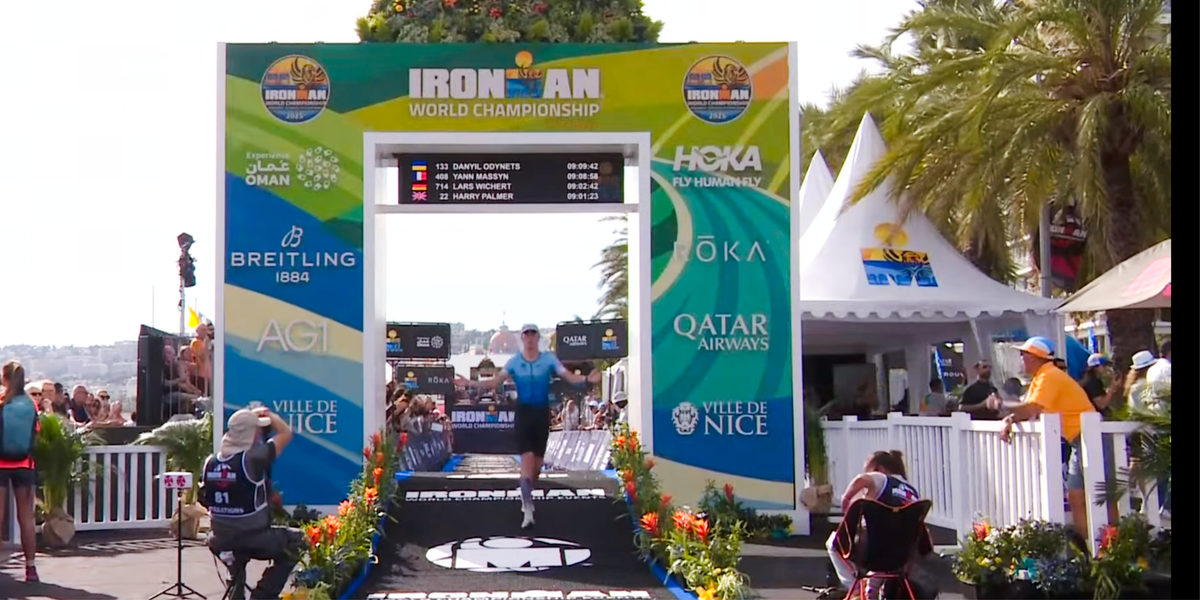Danyil Odynets Claims U24 World Championship Victory in Final Mile IRONMAN Drama
With 1.6 kilometers left, Danyil Odynets struck. The Ukrainian's final mile surge broke his rival to claim the U24 Ironman World Championship—a victory forged three years after war forced him to rebuild everything in Austria. From refugee to world champion in one decisive move.

Ukrainian triathlete executes tactical masterpiece to secure U24 Ironman World Championship title in Nice
Danyil Odynets crossed the finish line at the Ironman World Championship in Nice with a total time of 9:09:42, claiming the U24 world title after overtaking the race leader in the final mile of the marathon. The 21-year-old Ukrainian, competing under Austrian residence, demonstrated exceptional strategic execution to secure his first world championship victory.
The race unfolded as a tactical battle across three disciplines. Odynets emerged from the 3.8-kilometer Mediterranean swim in 59:02, positioning himself 20th overall in the field. His swim split placed him within striking distance of the leaders while conserving energy for the demanding bike and run segments ahead.
Bike Discipline Establishes Foundation
The 180-kilometer bike course through the Maritime Alps proved decisive in reshaping the race hierarchy. Odynets posted a bike split of 5:15:41, ranking fourth among all competitors in his division. This performance moved him from 20th position after the swim to genuine contention for the podium.
The bike segment revealed Odynets' tactical maturity. Rather than attacking aggressively on the early climbs, he maintained consistent power output while monitoring the front runners. This approach allowed him to arrive at the second transition with fresh legs and within range of the race leaders.
Weather conditions during the bike portion remained stable, with temperatures reaching 24 degrees Celsius and minimal wind interference. These conditions favored athletes with superior climbing ability, playing directly into Odynets' strengths developed through training in the Austrian Alps.
Marathon Execution Secures Victory
The 42.2-kilometer run became the defining segment of Odynets' championship victory. His marathon split of 2:49:02 ranked first in the U24 category, demonstrating the running foundation that initially attracted him to triathlon at age 13 in Kyiv.
The decisive move came with approximately 1.6 kilometers remaining in the race. Odynets, running in second position, executed a sustained surge that broke his nearest competitor. The acceleration proved terminal for the previous race leader, who had controlled the front position for the majority of the marathon.
Race officials confirmed that Odynets maintained negative splits throughout the marathon, running the second half faster than the first. This pacing strategy indicated superior race preparation and tactical awareness uncommon among athletes in his age category.
Technical Analysis of Performance
Odynets' transition times reveal advanced race craft. His first transition from swim to bike lasted 3:09, while his second transition from bike to run required only 2:48. These efficient transitions preserved valuable seconds and maintained his competitive position throughout discipline changes.
The victory margin over second place measured 39 seconds, a substantial gap that reflected the effectiveness of Odynets' late-race acceleration. Third place finished an additional 2 minutes and 30 seconds behind, confirming the tactical precision of the winning move.
Power output data from the bike segment showed consistent pacing with strategic accelerations on key climbs. Odynets avoided the common tactical error of responding to every early attack, instead building toward his strength on the run course.
Context Within Ukrainian Sport
This championship represents the highest-level international victory achieved by a Ukrainian triathlete since the beginning of the conflict in 2022. Odynets relocated from Kyiv to Austria following the invasion, rebuilding his training infrastructure while maintaining competitive development.
The victory carries additional significance given the disruption to Ukrainian sports programs. Many promising athletes have faced training interruptions, facility closures, and coaching changes due to the ongoing conflict. Odynets' success demonstrates the resilience of Ukrainian athletic talent despite systemic challenges.
Austrian training infrastructure proved crucial to this championship preparation. Access to Alpine training routes, professional coaching support, and consistent facility availability allowed Odynets to maintain the training volume necessary for world-class performance.
Professional Implications
The Nice victory positions Odynets advantageously for his planned transition to professional competition in 2026. World championship credentials provide enhanced negotiating power with potential sponsors and training groups.
Professional racing offers different competitive dynamics, with deeper fields and more aggressive tactical racing. However, Odynets' demonstrated ability to execute race-winning moves under championship pressure suggests readiness for this transition.
The victory also generates increased media attention and commercial opportunities. World championship titles create platform opportunities that extend beyond pure athletic achievement, particularly valuable for athletes representing nations affected by conflict.
Strategic Development Path
This championship victory validates Odynets' methodical approach to competitive progression. His timeline from first marathon at 16 to world champion at 21 reflects purposeful development rather than rushed advancement.
The Nice course knowledge gained through previous competition provided tactical advantages. Familiarity with climb profiles, technical descents, and transition logistics allowed focused preparation on performance variables rather than course adaptation.
Future championship defense will require elevated training demands and enhanced competition management. Defending champions face increased scrutiny and tactical targeting from competitors studying successful race strategies.
Broader Sport Context
Odynets' victory contributes to growing European dominance in long-distance triathlon. The traditional strongholds of American and Australian athletes face increasing challenge from European programs investing in systematic triathlon development.
The U24 category serves as crucial preparation for professional competition. Athletes who demonstrate championship capability at this level typically transition successfully to professional racing within two to three years.
This victory also highlights the effectiveness of cross-border training arrangements. Athletes relocating to access superior training infrastructure increasingly characterize modern triathlon development, requiring adaptation from traditional national program models.
Technical Lessons
The race demonstrated several key tactical principles. Controlled aggression during the bike segment preserved running capacity while maintaining competitive position. Patient race management avoided premature moves that often compromise final performance.
The timing of the decisive acceleration proved optimal. Moving with sufficient distance remaining to establish a decisive gap while avoiding excessive early effort that might invite counterattacks requires sophisticated race awareness.
Transition efficiency continues growing in importance as competitive fields deepen. Odynets' transition times matched those typically associated with professional racing, indicating technical preparation appropriate for his championship ambitions.
Championship Significance
World championship victories establish competitive credibility that extends beyond single race results. The Nice triumph provides Odynets with psychological confidence and competitive reputation valuable throughout his professional career development.
The victory also represents successful adaptation to challenging life circumstances. Maintaining world-class athletic performance while managing cultural transition, language barriers, and separation from family support systems requires exceptional mental resilience.
This championship establishes Odynets as a legitimate contender for professional success. The combination of tactical awareness, physical capability, and competitive temperament demonstrated in Nice suggests readiness for elevated competition levels.
The final mile surge that secured victory revealed the decisive attribute separating champions from competitors: the ability to perform optimally when the outcome remains uncertain. This quality, demonstrated under world championship pressure, indicates potential for sustained success at professional level.
Odynets' path from company fun run participant at 13 to world champion at 21 illustrates the unpredictable nature of athletic development. His victory serves as evidence that systematic preparation, tactical intelligence, and competitive courage can overcome circumstantial disadvantages to achieve the highest levels of sport.




Comments ()